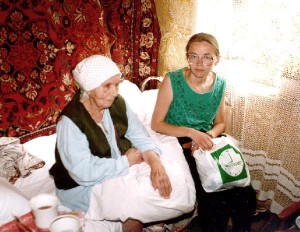The Northern European country of Estonia has a very intricate tradition of dressing the departed in specific funeral garb to prepare them for the next life. As a cultural event, a traditional Estonian burial upholds the importance of family and folklore — and it also shows a new way of looking at end of life. The ritual of preparing those who have passed begins by closing the eyes and mouth of the departed to ward off bad omens for surviving family members.
Traditionally this is followed by the ritual of washing, which can be performed either by a family member or for some regions by a distant relative (although today a non-relative washer may be paid for their services). The contact between the departed and a family member is an integral part of funeral preparations, because the closeness is meant to rid the fear of death from the surviving family. Fear of death and the departed plays a large role in Estonian culture, and healthy communication between the living and the dead is a way for Estonians to find balance and understanding in the connectedness of these two separate states of being.
“Healthy communication between the living and the dead is a way for Estonians to find balance”
Washers are also given the task of providing clothes according to the departed’s wishes. Generally, these clothes have been selected by the departed before his/her passing. Today, the tradition is not as widely practiced; nevertheless, it is still forbidden for the traditional burial clothing to be made without the aid of a sewing machine.
Knots in the burial clothes were said to tie the spirit down, sometimes preventing them from moving on. Providing the loved one who has passed with hats, scarves and comfortable shoes is an essential part of dressing the departed. In Estonian folklore, the long road is synonymous with death as it is said that the spirit must depart on a long and cold journey after passing. If the grave clothes are not suitable for this journey, the departed may visit family members in their dreams to demand the proper clothing for their journey. In this way, passing on signifies a parting of ways in Estonian folk culture rather than a finite end of being.
Related SevenPonds Articles:
- Swiss Pragmatism Extends into Death
- Article from the Estonian Folklore Archives
- The University of Tartu Estonian Literary Museum

 Estonia: Where Family and Folklore Thrive in Funeral Plans
Estonia: Where Family and Folklore Thrive in Funeral Plans




 John Mulaney’s “Funeral Planning” on Netflix: No Real Plan
John Mulaney’s “Funeral Planning” on Netflix: No Real Plan

 Composting Bodies Is Now Legal in a Dozen States
Composting Bodies Is Now Legal in a Dozen States














